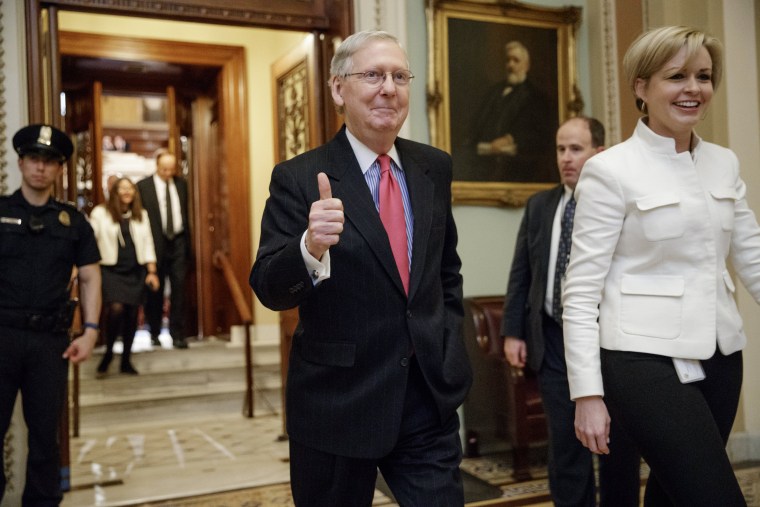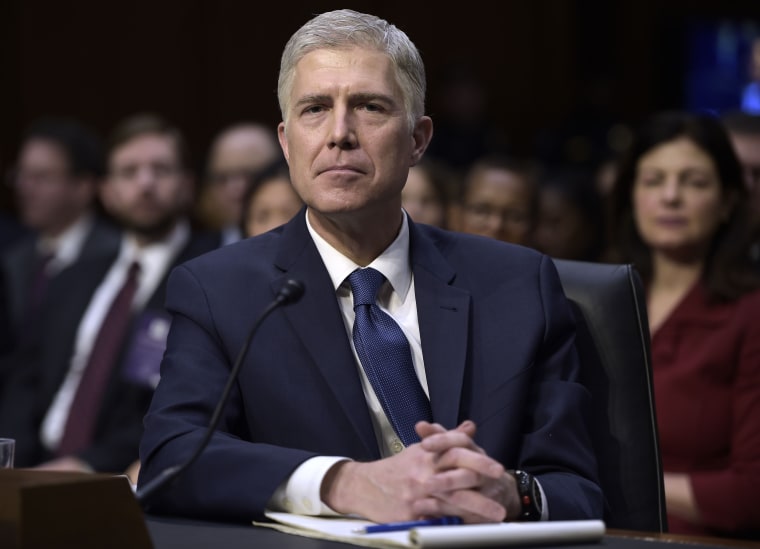Senate Republicans used the “nuclear option” Thursday to change the chamber's rules and clear the way for the confirmation of President Donald Trump’s Supreme Court nominee, Neil Gorsuch.
The rules change will enable Gorsuch to easily pass through the Senate with a simple majority instead of the now-defunct 60-vote threshold. A final confirmation vote is expected Friday.
The move by Republicans came after Senate Democrats blocked Gorsuch's nomination from advancing to a final vote earlier in the day. In a vote of 55 to 45, all but four Democrats voted to support a filibuster of the nomination, leading to the GOP rules change.
Rarely seen in the modern-day Senate, members sat in their desks through the hour-and-a-half long process on Thursday.
Senate Majority Leader Mitch McConnell triggered the procedures when he stood at his desk and addressed the Senate parliamentarian, who can be compared to a referee and maintainer of precedent.

“Our Democrat colleagues have done something today that is unprecedented in the history of the Senate. Unfortunately, it has brought us to this point. We need to restore the norms and traditions of the Senate and get past this unprecedented partisan filibuster," McConnell said.
"We will not allow their latest unprecedented act on judicial nominations to take hold. This will be the first, and last, partisan filibuster of a Supreme Court nomination," McConnell added.
With Sen. Orrin Hatch, R-Utah, as the presiding officer because of his role as president pro tempore, which is the highest ranking member of the Senate, the members then voted to set a new precedent. All Republicans voted for a measure to change the rules and all Democrats voted to oppose it.
The use of the nuclear option for Supreme Court nominees is dramatic for a body that honors precedent and rules and rarely changes the way it operates. In 2013, Democrats used the nuclear option on lower court and cabinet nominees but left the filibuster in place for Supreme Court appointees.
Related: What the Nuclear Option is And Why it Matters
"Wherever we place the starting point of this long, twilight battle over the judiciary, we are now at its end point," said Senate Minority Leader Chuck Schumer on the Senate floor ahead of the vote.
It is likely to change both the Senate and the future make-up of the nation's highest court. Because a nominee could pass with a simple majority instead of 60 votes, it’s much more likely that a more ideological candidate would be nominated, an action that some fear would polarize the Supreme Court.
Trump nominated Gorsuch, a judge on the 10th Circuit Court of Appeals, to replace Justice Antonin Scalia who died in February of 2016. President Barack Obama nominated Judge Merrick Garland to replace Scalia but Republicans, who were in the majority, refused to consider his nomination.
The four Democrats to oppose the filibuster were Sens. Joe Manchin of West Virginia, Joe Donnelly of Indiana, Heidi Heitkamp of North Dakota, all of which are up for re-election in 2018 in states that President Donald Trump won. Sen. Michael Bennet of Colorado also voted for Gorsuch to advance. Gorsuch is from Colorado.
